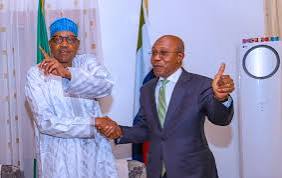The trial of the former Governor of the Central Bank of Nigeria (CBN), Godwin Emefiele, resumed on Wednesday, with significant testimony provided by Edward Adamu, a former Deputy Governor of the CBN.
Adamu appeared as the fourth prosecution witness in the ongoing case centered on the controversial naira redesign policy implemented under Emefiele’s leadership in late 2022.
Emefiele is facing charges brought by the Federal Government regarding his handling of the naira redesign, which caused widespread public and economic disruption.
The case is being heard before Justice Maryanne Anenih at the Federal Capital Territory High Court in Abuja.
How Emefiele Moved Funds From CBN Into Wife’s Account – Witness
During his testimony, Adamu revealed that Emefiele had bypassed the established protocol in the naira redesign process, a critical point in the prosecution’s case. Led in evidence by the prosecuting counsel for the Economic and Financial Crimes Commission (EFCC), Rotimi Oyedepo (SAN), Adamu explained that his experience with previous naira redesign exercises followed a strict process aimed at addressing currency volume, inflation, counterfeiting, and overall currency management.
However, Adamu claimed that the 2022 naira redesign, which took place during the administration of former President Muhammadu Buhari, did not follow the usual procedure.
According to him, the redesign was initiated without the approval of either the President or the CBN Board, which he described as a violation of the law.
He outlined the standard process, stating that a naira redesign typically begins with the Director of Currency Operations, who forwards the proposal to the Committee of Governors.
Afterward, the Committee submits the proposal to the CBN Board for approval before the President is involved. Adamu testified that Emefiele did not adhere to this process, instead claiming to have obtained presidential approval before consulting with the Board or the Committee.
Adamu’s testimony was further bolstered when he discussed evidence submitted to the court, identified as Exhibit E2. He noted that the current design of the naira notes differed slightly from what had been initially approved by both President Buhari and the CBN Board, alleging that these modifications were made unilaterally by Emefiele.
During cross-examination by defense counsel Olalekan Ojo (SAN), Adamu confirmed that it was customary for a board recommendation to precede any presidential approval in previous redesigns.
Ojo probed further, asking if there had been instances where the President approved a redesign without prior board consultation. Adamu responded that this was not standard practice during his tenure.
Ojo also raised questions about other instances where the President had approved funds for organizations such as ECOWAS or the military without consulting the CBN Board or Committee of Governors. Adamu acknowledged one such instance but maintained that this was an exception rather than the norm.
At one point, Ojo challenged the consistency of Adamu’s testimony, pointing out potential discrepancies between his court testimony and a previous statement he had given to the EFCC in February 2024.
The judge allowed Adamu to review his earlier statement to refresh his memory before the trial continued.
The defense also questioned whether Adamu was privy to any private discussions between Emefiele and the President regarding the naira redesign. Adamu stated that he was not involved in any such conversations.
Justice Anenih adjourned the trial to November 18, when further proceedings and testimonies are expected to take place. This case continues to attract attention, given its potential implications for Nigeria’s monetary policy and governance standards.
(Punch)
